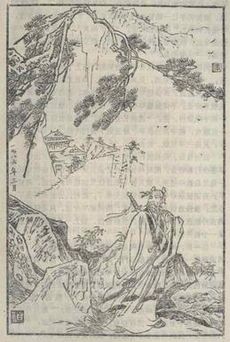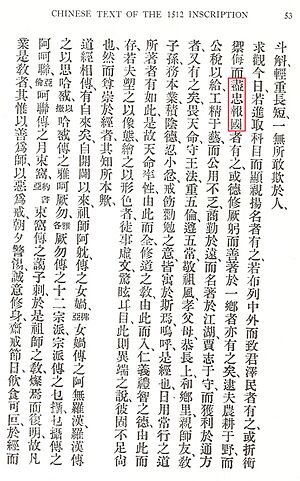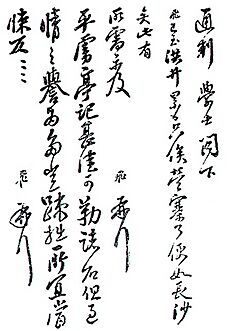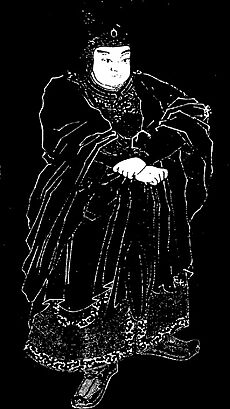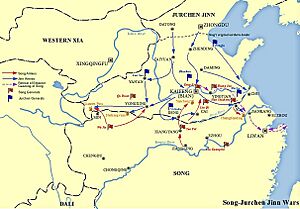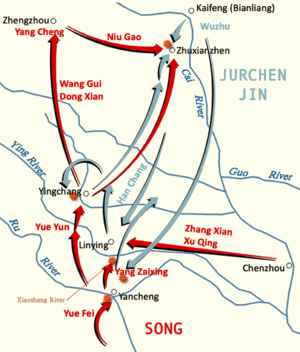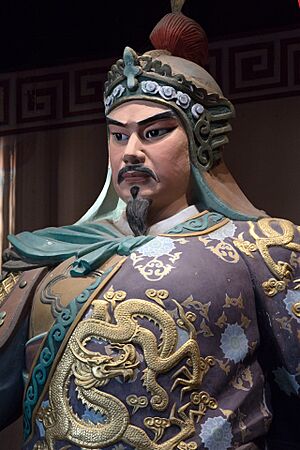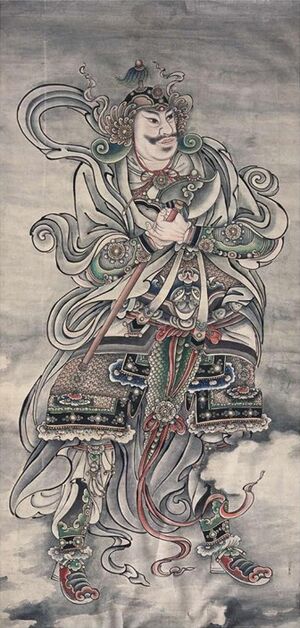Yue Fei facts for kids
Quick facts for kids
Yue Fei
|
|||||||||||||||||||||||||||||||||||
|---|---|---|---|---|---|---|---|---|---|---|---|---|---|---|---|---|---|---|---|---|---|---|---|---|---|---|---|---|---|---|---|---|---|---|---|
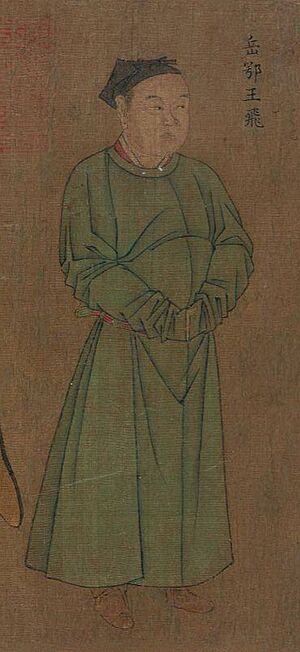
Portrait of Yue Fei in Liu Songnian's Four Generals of the Restoration.
|
|||||||||||||||||||||||||||||||||||
| Native name |
岳飛
|
||||||||||||||||||||||||||||||||||
| Born | March 24, 1103 Tangyin, Anyang, Henan, China |
||||||||||||||||||||||||||||||||||
| Died | January 28, 1142 (aged 38) Hangzhou, Zhejiang, China |
||||||||||||||||||||||||||||||||||
| Allegiance | Song dynasty | ||||||||||||||||||||||||||||||||||
| Years of service | 1122–1142 | ||||||||||||||||||||||||||||||||||
| Battles/wars | Song–Jin wars | ||||||||||||||||||||||||||||||||||
| Chinese name | |||||||||||||||||||||||||||||||||||
| Traditional Chinese | 岳飛 | ||||||||||||||||||||||||||||||||||
| Simplified Chinese | 岳飞 | ||||||||||||||||||||||||||||||||||
|
|||||||||||||||||||||||||||||||||||
Yue Fei (Chinese: 岳飛; March 24, 1103 – January 28, 1142) was a famous Chinese military general. He lived during the Southern Song dynasty. People remember him as a great national hero of China. He led the Song forces in wars against the Jurchen-ruled Jin dynasty in northern China. Because he wanted to keep fighting, the Southern Song government had him put to death in 1142. This happened after a peace agreement was made with the Jurchens. Yue Fei is shown in a famous book called Wu Shuang Pu, which means "Table of Peerless Heroes".
Yue Fei's family came from Tangyin, Henan, which is in present-day China. After he died, he was given special honors. In 1169, he was called Wumu (武穆), meaning "Martial and Stern". Later, in 1211, he was given the noble title King of È (鄂王). Since his death, Yue Fei has become a symbol of loyalty in Chinese culture.
Contents
Who Was Yue Fei?
Learning About Yue Fei's Life
A book about Yue Fei, called Eguo Jintuo Zubian, was written by his grandson, Yue Ke. This was about 60 years after Yue Fei died. Yue Ke was a poet and historian.
In 1346, this biography was added to the History of Song. This huge book has 496 chapters. It records historical events and stories of important people from the Song dynasty. Yue Fei's story is in chapter 365.
Why Was He Named "Fei"?
According to the History of Song, Yue Fei was named "Fei" because it means "to fly". When he was born, a large bird, like a swan, landed on the roof of his house. This was seen as a special sign.
Yue Fei's Early Life
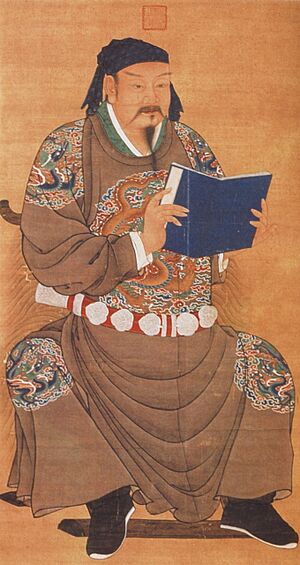
Yue Fei was born into a poor farming family. This happened in Tangyin County, Henan province. Stories say that when he was a baby, the Yellow River flooded. His mother put him in a clay jar to save him. The jar floated down the river, and they survived.
Yue Fei's father taught him many things. He learned to read and study military books. In 1122, Yue Fei joined the army. But he had to go home later that year when his father died. In ancient China, people had to leave their jobs to mourn their parents.
Learning Martial Arts
A popular story, Shuo Yue Quanzhuan, tells more about Yue Fei's early life. It says he and his mother were saved by a kind man named Wang Ming. They stayed at his home. Young Yue Fei became a student of Wang's teacher, Zhou Tong. Zhou Tong was a famous master of military skills.
Zhou Tong taught Yue Fei and his three sworn brothers. They learned reading on some days and military skills on others. These skills included archery and using many different weapons.
Yue Fei became very good at archery. He won first place in a military test by shooting nine arrows through a target from far away. He joined the Song army to fight the Jurchen invaders.
The Yue Fei Biography says he was very strong. Even before he was an adult, he could use a very heavy bow and crossbow. He learned archery from Zhou Tong and could shoot with both hands. Another book says he learned spear fighting from Chen Guang. By the age of 19, when he joined the army, he had already learned many martial arts skills.
The Famous Tattoo
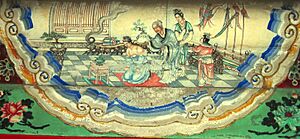
Yue Fei is famous for a tattoo on his back. It had four Chinese characters: jin zhong bao guo (traditional Chinese: 盡忠報國; simplified Chinese: 尽忠报国; pinyin: jìn zhōng bào guó; literally "serve the country with the utmost loyalty"). This means "serve the country with the utmost loyalty."
Historical records say Yue Fei had a tattoo artist put these words on his back. Later stories, like Shuo Yue Quanzhuan, say his mother gave him the tattoo. She did this to remind him to always be loyal to his country. This legend is very popular in China.
Even the Kaifeng Jews, a group of Chinese Jews, mentioned this tattoo. They wrote about it on their stone monuments in the 1400s and 1600s. They spoke of "Boundless loyalty to the country and Prince."
Yue Fei's Adult Life
What Yue Fei Looked Like

A painting from the Southern Song dynasty shows Yue Fei. It's called "Four Generals of the Restoration." In this painting, Yue Fei looks more like a scholar. He is shorter and a bit chubbier than the tall, thin statue of him in Hangzhou today. Many believe this painting shows his true appearance.
Yue Fei's Character
Yue Fei loved to read military books. He especially liked the strategies of Sun Tzu. Even though he could have been a scholar, he chose to be a soldier. He wanted to be like famous Chinese heroes from the past.
Yue Fei welcomed scholars into his army camps. They would tell stories of old heroes to inspire his soldiers. He hoped his own brave deeds would also be recorded. He wanted to be as famous as heroes like Guan Yu from the Three Kingdoms period. Later, people did see him as great as Guan Yu.
Yue Fei's Family
Yue Fei had five sons and one daughter. His eldest son, Yue Yun, was also a soldier. His second son, Yue Lei, took over his father's position later. The other sons were Yue Ting, Yue Lin, and Yue Zhen. His daughter was named Yue Yinping in stories, but her name is not in history books.
Yue Fei was married twice. His first wife left him and his mother. He later married a second wife. He loved her, but his main goal was to protect China from the invaders.
Military Achievements
Yue Fei joined the Song military in 1122. He returned in 1126 after his father's death. He fought against local rebellions that were taking resources from the war against the Jin. He also helped defend the city of Kaifeng from the Jin.
After Kaifeng fell, he joined an army to defend the Yangtze River. In 1129, his army stopped the Jurchens from crossing the river. His skills as a leader became well-known. In 1133, he became a general of a large army.
Between 1134 and 1135, he led successful attacks against a state supported by the Jin. He took back lands that the Jurchens had conquered. He kept getting promoted and his army grew bigger. He led many successful attacks into northern China.
Yue Fei and other generals helped the Song dynasty survive. Like many of them, he wanted to take back all of northern China. In 1140, Yue Fei launched a big attack against the Jin armies. He won many battles and got close to Kaifeng, the old capital. He was ready for a final attack.
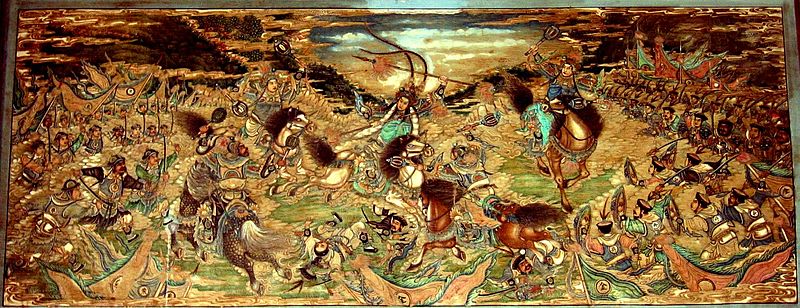
However, a powerful official named Qin Hui ordered Yue Fei to stop his campaign. In 1141, Yue Fei was called back to the capital.
Yue Fei's Death
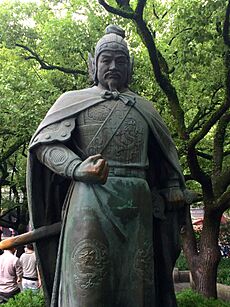
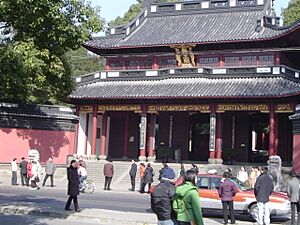
In 1126, the Jurchen-ruled Jin dynasty invaded northern China. They captured the Song capital, Kaifeng, and the emperor. This started the Southern Song dynasty.
Yue Fei fought for a long time to take back northern China. He was close to recapturing Kaifeng. But some officials told Emperor Gaozong to make peace with the Jurchens. The emperor worried that if Kaifeng was retaken, the old emperor might be freed. This could threaten his own rule.
So, Emperor Gaozong sent 12 orders to Yue Fei, telling him to return to the capital. Yue Fei obeyed and went back. He was then put in prison. The official Qin Hui arranged for him to be executed on false charges.
There are different ideas about how Yue Fei died. Some sources say he died in prison. Others say Qin Hui had him and his son executed.
After His Death

Years later, in 1162, Emperor Xiaozong cleared Yue Fei's name. He restored his honors. For their part in Yue Fei's death, iron statues of Qin Hui, his wife Lady Wang, and two of Qin's helpers were made. These statues kneel before Yue Fei's tomb in Hangzhou.
A tomb was built for Yue Fei. He was given the special name Wumu (武穆), meaning "Martial and Stern." In 1179, he was honored as Zhongwu (忠武), meaning "Loyal and Martial."
Yue Fei's Skills
Martial Arts
Yue Fei is linked to several martial arts styles. Two of the most famous are Eagle Claw and xingyiquan. Some stories say he created Eagle Claw for his soldiers and xingyiquan for his officers.
One legend says Yue Fei learned from a monk named Zhou Tong at the Shaolin Monastery. He learned a style called "elephant boxing," which focused on joint-locking techniques. He supposedly expanded this into the "108 Locking Hand Techniques" of Eagle Claw. After he became a general, he taught this style to his soldiers. They used it well in battles against the Jin dynasty.
Another legend says Yue Fei created xingyiquan by combining his knowledge of internal martial arts and spear fighting. Some believe he learned this style in the Wudang Mountains. This is because xingyiquan's five fist attacks are based on the Five Chinese Elements, which are linked to Taoist ideas.
Other martial arts also linked to Yue Fei include Yuejiaquan (Yue Family Boxing), Fanziquan (Tumbling Boxing), and Chuōjiǎo quan (Feet-Poking Boxing). The "Fanzi Boxing Ballad" says that Yue Fei passed down Fanziquan.
Besides fighting skills, Yue Fei is also said to have studied traditional Chinese medicine. He created his own form of "medical qigong" called the Ba Duan Jin (八段錦; "Eight Pieces of Brocade"). He taught this to his soldiers to help them stay strong and ready for battle.
Poetry
Yue Fei is said to have written a famous poem called "Man Jiang Hong" ("Entirely Red River"). This poem shows his strong dislike for the Jurchen-ruled Jin dynasty. It also expresses his sadness that his efforts to take back northern lands were stopped by officials who wanted peace. However, some historians think this poem was written much later, in the 1500s.
Yue Fei also wrote at least two other poems. One is "Xiao Chong Shan" ("Small Hills"). The other is another "Man Jiang Hong" about his feelings while climbing the Yellow Crane Pavilion.
Yue Fei's Descendants
Yue Fei has many descendants. One famous descendant was Yue Zhongqi from the Qing dynasty. He was a high-ranking official and general. He even helped conquer Tibet for the Qing dynasty.
Another notable descendant was Yue Yiqin. He was a skilled pilot during the Second Sino-Japanese War.
Today, Yue Fei's family still remembers his story. In 2011, some of his descendants protested a statue of Qin Hui. This shows that even after centuries, the Yue family still feels strongly about what happened to their ancestor. It was once a rule that male members of the Yue family could not marry anyone with the surname Qin. This rule was rarely broken until 1949. In 2017, it was reported that there were over 1.8 million descendants of Yue Fei in China.
Yue Fei: A National Hero
After his death, Yue Fei became a huge folk hero in Chinese history. Later historians often blamed Qin Hui and sometimes Emperor Gaozong for his execution. They were seen as responsible for making peace with the Jin dynasty.
While stories say Qin Hui worked with the Jin to execute Yue Fei, this has never been fully proven. The real Yue Fei was a skilled general. He might have been able to read and write, but he wasn't a scholar in the same way as some other officials.
Yue Fei was not the only general fighting the Jurchens. He was one of many who fought to protect China. Many of the exaggerated stories about Yue Fei came from the biography written by his grandson. Yue Fei's status as a hero grew stronger during the Yuan dynasty. Temples and shrines were built to honor him in the Ming dynasty. Even a Chinese World War II song mentions lyrics said to be written by Yue Fei.
He is sometimes seen as a door god with another deity, Wen Taibao.
In modern times, Yue Fei is still considered a national hero in China. Both the Chinese Ministry of Education and the Minister of Defence officially call him a national hero.
Images for kids
-
Statues of Lady Wang (秦王氏) and Qin Hui (秦檜) at the Yue Fei Temple, Hangzhou
-
Statues of Moqi Xie (万俟卨) and Zhang Jun (張俊) at the Yue Fei Temple, Hangzhou
See also
- Cultural depictions of Yue Fei
- Yue Fei Temple
- Tomb of Yue Fei
- Han Shizhong
- Zhang Jun
- Wen Tianxiang
- Lu Xiufu
- Zhang Shijie
- History of the Song dynasty
- Jin–Song Wars
- Timeline of the Jin–Song wars
- Yuan Chonghuan
 | Charles R. Drew |
 | Benjamin Banneker |
 | Jane C. Wright |
 | Roger Arliner Young |


